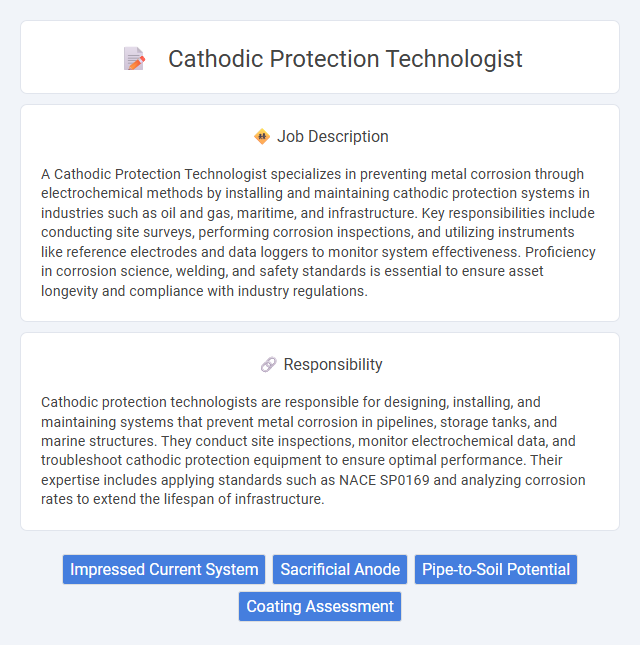
A Cathodic Protection Technologist specializes in preventing metal corrosion through electrochemical methods by installing and maintaining cathodic protection systems in industries such as oil and gas, maritime, and infrastructure. Key responsibilities include conducting site surveys, performing corrosion inspections, and utilizing instruments like reference electrodes and data loggers to monitor system effectiveness. Proficiency in corrosion science, welding, and safety standards is essential to ensure asset longevity and compliance with industry regulations.
Individuals with a strong interest in corrosion prevention and hands-on technical work are likely to find a cathodic protection technologist role suitable. Those comfortable working in various environments, including outdoor and industrial settings, may have a higher probability of thriving in this job. Physical endurance and attention to detail also tend to be important factors influencing job suitability.
Qualification
A Cathodic Protection Technologist must possess a strong background in electrical or corrosion engineering, often supported by a diploma or degree in these fields. Proficiency in interpreting technical drawings, performing on-site inspections, and utilizing specialized testing equipment such as CP rectifiers and reference electrodes is essential. Certification from recognized bodies like NACE International enhances credibility and demonstrates expertise in safeguarding metallic structures against corrosion.
Responsibility
Cathodic protection technologists are responsible for designing, installing, and maintaining systems that prevent metal corrosion in pipelines, storage tanks, and marine structures. They conduct site inspections, monitor electrochemical data, and troubleshoot cathodic protection equipment to ensure optimal performance. Their expertise includes applying standards such as NACE SP0169 and analyzing corrosion rates to extend the lifespan of infrastructure.
Benefit
The role of a Cathodic Protection Technologist likely offers significant benefits such as enhanced safety in infrastructure by preventing corrosion, which can reduce maintenance costs and extend the lifespan of critical assets. There is a probable demand for such expertise in industries like oil and gas, water treatment, and construction, potentially leading to good job stability and opportunities for specialization. Benefits may also include hands-on experience with advanced monitoring and testing equipment, contributing to professional growth and technical skill development.
Challenge
The role of a cathodic protection technologist likely involves overcoming challenges related to preventing corrosion in complex infrastructure, which requires precise monitoring and application of protective measures. Navigating variable environmental conditions and material properties may pose significant difficulties in maintaining system integrity over time. Problem-solving skills and adaptability could be essential to address unexpected failures and optimize protection strategies effectively.
Career Advancement
Cathodic protection technologists specialize in preventing metal corrosion through electrochemical methods, a critical skill in infrastructure maintenance. Career advancement opportunities include progressing to senior technologist roles, project management, or consultancy positions within industries such as oil and gas, marine, and construction. Gaining certifications from NACE International and expanding expertise in pipeline integrity and materials science significantly enhances career growth potential.
Key Terms
Impressed Current System
Cathodic protection technologists specializing in Impressed Current Systems design, install, and maintain electrical systems that prevent metal corrosion in pipelines, storage tanks, and marine structures. Their expertise includes monitoring current density, potential levels, and the integrity of anodes to ensure optimal system performance and compliance with industry standards such as NACE and ISO 15589. Proficiency in data analysis and troubleshooting enables technologists to enhance system efficiency, extend asset lifespan, and reduce maintenance costs.
Sacrificial Anode
A Cathodic Protection Technologist specializing in Sacrificial Anode systems designs and maintains corrosion control methods by installing zinc, magnesium, or aluminum anodes on metal structures. This role requires expertise in electrochemical principles to prevent metal deterioration in pipelines, tanks, and marine vessels through galvanic protection. Proficiency in monitoring anode consumption rates and ensuring optimal anode placement is essential for effective long-term corrosion mitigation.
Pipe-to-Soil Potential
Cathodic protection technologists specialize in monitoring and analyzing Pipe-to-Soil Potential (PSP) to prevent corrosion in underground pipelines. Accurate PSP measurements are essential for assessing the effectiveness of cathodic protection systems and ensuring pipeline integrity. These professionals use specialized instruments to detect potential differences, enabling timely maintenance and extending the lifespan of infrastructure.
Coating Assessment
Cathodic protection technologists specializing in coating assessment play a crucial role in preventing corrosion of metal structures by evaluating the integrity and performance of protective coatings. They conduct detailed inspections using techniques such as holiday testing, adhesion tests, and visual assessments to identify coating defects and degradation. Expertise in interpreting coating condition data ensures the implementation of effective maintenance strategies that extend asset lifespan and reduce downtime.
 kuljobs.com
kuljobs.com